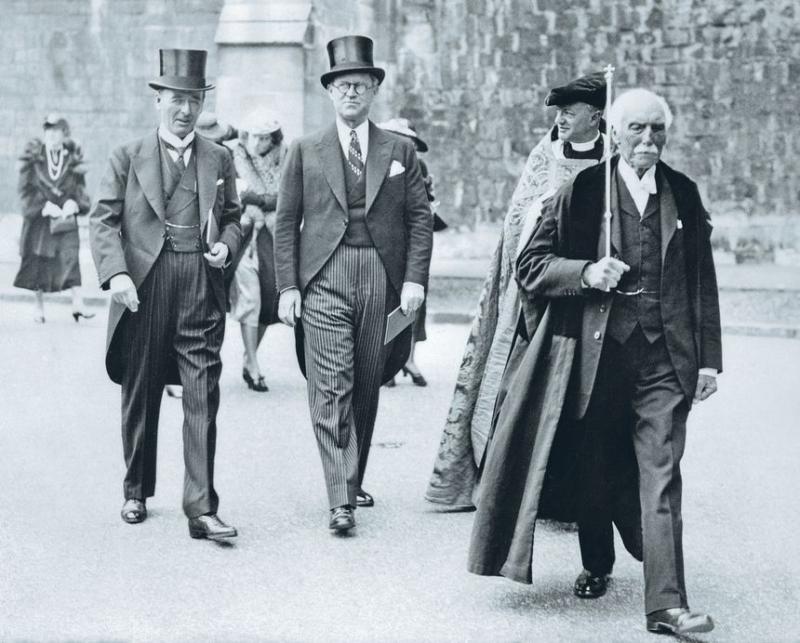'The Ambassador' Review: Joseph Kennedy's Diplomatic Disaster
By: David M. Shribman (WSJ)



He was manipulative—and manipulated. He was a boor—and a bore. He had gumption—and guile. He was a vicious infighter—and a reflexive appeaser. He was imperious in manner—and impervious to advice. He was the paterfamilias to a political dynasty—and a notorious philanderer. He was ambitious—and defeatist.
Joseph P. Kennedy was all these things, and as the American ambassador to the Court of St. James's during the critical years of 1938 to 1940, he pulled off a statecraft inside straight: He managed to alienate his sponsor (Franklin Delano Roosevelt), his direct supervisor (Secretary of State Cordell Hull), his ally in appeasement (Prime Minister Neville Chamberlain) and his diplomatic colleagues (both American and foreign).
Historians and Kennedy-watchers always knew that President Kennedy's father was a difficult character—a "problematic" one, as we might say today. For a long time he showed up principally in chronicles of the Irish ascendancy in America, as background in JFK biographies, or as an aside in histories of American foreign policy in the period before the United States entered World War II. In recent years we've learned more about him—a good deal of it not very flattering. But seldom has the Joe Kennedy story been told in such a searing, remorseless way as it is in Susan Ronald's "The Ambassador" (St. Martin's, 441 pages, $29.99), her account of Kennedy's foray into diplomacy.
"Kennedy did not have the skill set of a career diplomat," Ms. Roland says with admirable understatement. The son of a Boston barkeep with political influence, he found political advantage—as did his sons in the next generation—in the fact that his grandparents on both sides were Irish Catholics. Step by audacious step Joe Kennedy—part trimmer (in the argot of Old Boston) and part striver (in the manner portrayed in countless American success stories)—worked his way up, not always scrupulously: small-town banker, Wall Street financier, Hollywood film entrepreneur. Roosevelt made him the first chief of the Securities and Exchange Commission out of the devout conviction that it took a thief to catch a thief. He sent him to London to get him out of the way and kept him there to keep a distance from someone he considered "a very dangerous man." Nonetheless, FDR said, "I have made arrangements to have Joe Kennedy watched hourly and the first time he opens his mouth and criticizes me, I will fire him." That, of course, was only one of FDR's broken presidential promises.
Ms. Ronald, a versatile biographer whose previous work ranges from Shakespeare to Nicholas II, paints Joe K. as a gifted talker and natural networker. He had the financial resources for the job—no poor man was sent abroad in those days—but not the temperament. "He valued his own opinion too much to analyze the personalities he would need to assess accurately for the good of the United States and Great Britain." As Ms. Ronald implies: The right ambassador is an asset to the country he represents—and to the country in which he serves.
Kennedy served neither, because he misunderstood the main currents of his time. We might not linger over the ambassadorial years of a single appointee if Kennedy’s tenure hadn’t occurred at one of the great hinges of history. He was, to be sure, on solid ground in opposing Communism, which he loathed largely for its hostility to religion. But he utterly failed to comprehend that fascism posed a moral and mortal threat to Europe.
He misread every cue from Hitler, and Ms. Ronald faults him for failing to see the dangerous but possible Realpolitik advantage of countering the Nazis with their natural enemies to the east, the Soviets. He was not alone in those miscues, of course, but Ms. Ronald portrays him, with archival anecdote and sharp judgment, as especially easily bamboozled, which is not surprising about someone who actually had lunch with Charles and Anne Lindbergh amid the Munich Crisis of September 1938. From start to finish, the State Department was aghast, and Cordell Hull, who had no patience for such naivete, first considered him an irritant and then an impediment, especially as Kennedy continued to insist that the economic health of Europe—supposedly helped by sowing peace rather than courting war—was more important than its political health.
Ms. Ronald shows Kennedy to have been every bit the anti-Semite of reputation—well-trod ground—though she does argue that Kennedy’s interest in the Jews also had an element of self-interest. He cynically thought that as the peril to the Jews deepened in Germany, public support for their plight might win him the backing of Jews in America, perhaps even help catapult him to the White House.
Kennedy was also accomplished in the twin arts of the faux pas and the breach of protocol. It simply was not done for the American envoy to muscle in to have the first dance with the Queen. Nor was it adept to show up with an entourage of 15—including eight Kennedy children—at the Vatican for Mass when only two seats had been set aside for him. He scored no points for holding his first press conference in London in shirt-sleeves, feet on his desk. No one spoke of “the Kennedy style” in London in 1938 the way so many did in Washington in 1961. Apparently the sins of the father, in that realm if not in marital fidelity, were not visited upon the second son.
Kennedy’s ardent support of appeasement pleased Neville Chamberlain and his circle—until it didn’t. Kennedy and Washington were increasingly at odds, in part because Kennedy favored the side of the prime minister over that of his own president. FDR, we should remember, was from the late 1930s a cagy supporter of American rearmament and an ardent but less subtle critic of Nazi Germany, and he worked to get around America’s neutrality laws and lend aid to the British. Kennedy’s outlook was, at a minimum, out of sync with the president’s.
All of this contributed to a “how-do-you-solve-a-problem-like-Joe” puzzle. Ms. Ronald’s assessment of the Kennedy conundrum at the beginning of his ambassadorship is stark: “Kennedy was muddying foreign policy by communicating with the press without instruction or approval. Worse still, the president could not recall Joe after a piffling six weeks without raising serious questions about his own judgment.” She is equally deft at capturing the Kennedy conundrum as the difficulties mounted and the war clouds darkened—and as Kennedy, by word and deed, misrepresented the instincts and intentions of the administration that made him its minister in London: “Roosevelt did not want Kennedy back in Washington, giving hourly succor to the isolationists in Congress, particularly as the self-proclaimed expert in European affairs and avid publicity seeker. Yet if the president recalled Kennedy . . . Joe would become even more disloyal to the president’s foreign policies and the prospect of winning a third term.”
In the 17th century, Sir Henry Wotton set forth a classic axiom describing the job of an ambassador, as “an honest gentleman sent to lie abroad for the good of his country.” The tragedy of Joe Kennedy is that he satisfied only the middle part of the definition.
—Mr. Shribman, a former Journal political reporter, teaches at the Max Bell School of Public Policy at Montreal’s McGill University.

Who is online
51 visitors

